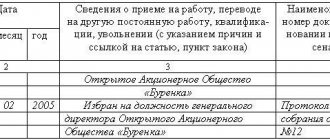The best learning comes from hands-on experience. In working conditions, such a period when theoretical knowledge and skills are “tested” in practice is called “internship”.
- Is it mandatory for every employee?
- How should an employer formalize this process correctly?
- Is it possible to fire an employee due to unsatisfactory results of an internship?
- Should I pay or not pay wages for this period?
Many participants in labor relations confuse the concept of internship with a probationary period and initial instruction. There are many nuances, they need to be clarified.
What is an on-the-job internship , the responsibility of which falls on the employer, and who should complete it?
What is the internship for?
The main point of an internship is that an employee learns directly in the process of his production activities. This period, when both study and activity occur simultaneously, helps the employee to practically master work skills in new conditions.
Question: Is it necessary to conduct an internship for electrical engineering personnel to develop individual internship programs (for each employee) depending on the level of professional education, work experience and profession (position) of the trainee, or is it sufficient to develop standard internship programs for each position (workplace) and approve them in the prescribed manner? View answer
Most often, the need for an internship is obvious in the following situations.
- First job. Yesterday's student received theoretical training in his specialty, but he certainly lacks practical skills due to lack of experience. Under the guidance of an experienced mentor in real working conditions, practical training will take place quickly and effectively.
- Harmful and dangerous conditions. If a person starts working under such working conditions, then he needs a period of supervision by experienced supervisors who will help him orient himself and avoid possible cases of work-related injuries and harm to health.
- Change of workplace . If a person did not change employer, but only a position, for example, moved to another department, received other responsibilities, or even went for a promotion, he will need time to understand the new working conditions. An internship will provide this opportunity.
NOTE! An internship is necessary in any situation when a person starts a new job, regardless of his experience and theoretical training.
Duration
The legislation does not establish the exact duration of the internship; it only limits its maximum permissible duration. Depending on how the employee was registered, this period may be:
- 2 months - if a fixed-term employment contract was concluded;
- 3 months - if the employee was hired on a probationary period.
The specific duration must be specified in the employment contract. Otherwise, it will be considered that the period is set at the maximum amount. After its end, the employer must either continue the relationship with the employee and conclude a new contract with him, or refuse him further employment.
In this case, both parties have the right to terminate the relationship before the end of the established period. The only condition for this is to notify the other party of the termination of work at least three days in advance (by writing a statement or issuing a corresponding order).
The employee has the unconditional right to terminate the relationship early, and he is not obliged to explain the motives and reasons for his action.
But the employer must document the intern’s inadequacy for the future position: memos, acts, etc.
What does the law say about internships?
The provisions on employee internships are enshrined in the Labor Code of the Russian Federation and related documents. The regulations set out the regulations for internships, as well as the categories of employees for whom this process is mandatory, including the responsibility of the employer. The internship procedure is defined in the following legislative acts:
- Art. 212 of the Labor Code of the Russian Federation;
- Resolution No. 1-29 of the Ministry of Education of January 13, 2003;
- Order No. 37 of Rostechnadzor dated January 29, 2007;
- GOST 12.0.004-90 clause 7.2.4;
- Letter RD-200-RSFSR-12-0071-86-12.
How to arrange occupational safety training in the form of an internship ?
Tip 3: people don’t bite, you can and should talk to them
Fear of communication with people and low communication efficiency are the main enemies of interns. After laziness. But, unlike laziness, this disease is amenable to a systemic solution - mainly through awareness of the causes of its origin.
Firstly, you are in a new relationship model. Before this, you communicated with relatives, friends, teachers, partners. In the office, you have managers and colleagues, and communicating with them is different from communicating with the other four categories, although not particularly difficult.
Supervisor. Remember that this person became your leader because he wanted it and because he liked you. He worries about the success of your internship in some places more than you do. At the same time, the manager is the second person on whom the success of the internship depends. The first, of course, is you. Successful communication with a manager is based on very specific things:
- Meet 1:1 at least once a week. If such a meeting does not exist, you must explicitly ask for it. If the manager has absolutely no time, such a meeting could be lunch. Make sure that this meeting has an opt-out format and not an opt-in format, otherwise in fact it will take place no more than once a month.
- Formulated written objectives for the internship.
- Regular feedback from your manager about your work. Tips for improving the project and personal development. Often, an inexperienced manager is embarrassed to give full feedback, and the trainee does not want to hear it for fear that it will not be positive. If you really want to grow during your internship, you will have to overcome the fear of criticism.
Colleagues. As a rule, they sincerely wish you success and are ready to devote time to bring this success closer. Feel free to ask your colleagues questions when your manager is busy or absent, join in discussions on non-work issues, and never refuse an offer to go out to lunch.
Leader of the leader (aka step). Of particular interest to the curious trainee. Most likely, this is a very busy person, but if you ask (for example, through your supervisor), he will not refuse you one or two 1:1 meetings during the internship.
Positive aspects of the internship for both parties
IMPORTANT! A sample workplace internship program from ConsultantPlus is available here
Practical activities under the guidance of a more experienced specialist are of great benefit to both sides of the labor process. Thanks to the internship, the employee :
- acquires or improves practical work skills in his specialty;
- can evaluate himself in the context of new working conditions;
- clarifies the range of his immediate responsibilities and requirements for them;
- joins the team, begins to build relationships with colleagues, superiors or subordinates;
- gently adapts to new working conditions, schedule, workplace, routine requirements and discipline.
Advantages of an internship for an employer :
- compliance with legislation regarding requirements for creating safe working conditions;
- increasing employee efficiency by reinforcing theoretical training with practical skills;
- increasing the level of training and qualifications of employees, and therefore their productivity;
- reducing the risk of harm to health at work;
- direct acquaintance with the employee’s work style, development of management strategy.
ATTENTION! The only negative aspect of an internship can be its incorrect organization, when the employee’s rights are violated or the process is carried out with violations, and therefore ineffective.
Making a decision based on the results of the internship
The final decision on the further employment of an employee can be made in the following ways:

- Based on the curator's review. As already noted, this document is drawn up in almost all cases and contains the conclusions of the trainee’s immediate supervisor about him. The supervisor can most accurately indicate how successfully the employee coped with his responsibilities and what tasks he was unable to complete.
- Based on the exam results. Its implementation allows you to determine how well the employee has mastered the training. The exam can take place in different forms: orally, in writing, with practical tasks. The specific method of carrying it out is determined on an individual basis.
- Based on the employer's personal assessment. During the internship, the employer often has the opportunity to independently observe the intern: his training, success at work and behavior in the team. Based on this, he decides whether to leave him in the company or not.
In the event that for some reason the employee is not suitable and the employment relationship with him will not be continued, it is advisable that the employer has documentary grounds for such a decision. For example, negative feedback from a supervisor, poor exam results, etc.
Otherwise, the trainee will be able to challenge the refusal of further employment in court.
How to get maternity leave if you don’t work - full information in our article! All the information you need on calculating sick leave is on our resource. The targeted article written by our professionals contains all the information on this topic. How to resolve the issue of sick leave pay after your dismissal - read here.
For whom an internship is inevitable?
The law talks about mandatory internships for certain categories of people just starting work. These include:
- Young professionals;
- employees who came to work in harmful and/or dangerous conditions;
- operators of technological and/or industrial installations;
- drivers of public transport (minibuses, trolleybuses, trams, buses).
IMPORTANT! For other categories of employees, the internship must be carried out in accordance with Part 2 of Art. 212 of the Labor Code of the Russian Federation, which speaks of the need for the employer to provide training in safe labor practices and organize workplace safety briefings and internships. Many employers believe that in other cases an internship is not required, although this is not the case. The law only allows for a reduction in training time.
Hiring an intern
The employment of an intern is carried out in an official manner: he writes an application for employment for a certain position, on the basis of which an order for his employment is issued, and an employment agreement is concluded. Next, the HR department enters a record of employment as an intern in the work book.

A job application is written using the standard form:
- Business name.
- Position and full name leader.
- Your full name, residential address.
- Request for acceptance into a position as a trainee or apprentice.
- Personal signature and date of writing the application.
You can download a sample of such a statement here.
The employment contract is drawn up in accordance with the text of the application: if the applicant wishes to train for any position, then the contract is called an apprenticeship contract. It differs from the internship in that the student is assigned a mentor, whose duty is to teach him the profession, accompany the practice and take the exam at the end of the term. When concluding a student agreement, an entry about this is not made in the work book.
If the applicant for a position has a special education and relevant work experience, then it is enough for him to demonstrate his skills in practice, so a standard employment contract is concluded with him with a mention of the internship period.
Regardless of the status of the trainee, it must be formalized in order to avoid complaints from the labor inspectorate.
Features of the program
The internship program is individual for each category of employee, position, specialty, and qualification. It is developed by the internship supervisor (mentor appointed by order) and approved by superiors. The content of the program necessarily includes the following items:
- the purpose of the internship;
- requirements for the trainee;
- the names of the documentation that he must study;
- the duties that the intern will perform, his job description;
- a set of training activities: familiarization with the workplace, the territory of the organization, study of work processes (according to competencies), etc.;
- ensuring the acquisition of practical skills (taking into account labor protection);
- test based on the results of the internship.
Each stage should have a specific time planned (in hours or shifts), which can be adjusted if necessary.
What is the difference between an internship and a probationary period?
What is the difference between an internship and a probationary period, because they have quite a lot in common. But there are significant differences. Like, for example, the fact that a probationary period is usually assigned to candidates who come from related professions. For example, candidates responded to the recruitment of technical personnel:
- yesterday's student who just received his diploma;
- a specialist working in a company with illogical activities;
- a specialist who previously worked in an organization specializing in another type of activity;
In the first case, completing an internship should be a prerequisite for considering a candidate. In the second case, only a probationary period is possible. In the third case, the decision is made by the head of the company.

Thus, a probationary period is not training, not an increase in qualifications, not an attempt to increase competence. During the probationary period, the candidate is not assigned an internship supervisor. A candidate for a vacancy demonstrates the skills that he acquired previously. During the probationary period, a candidate for a certain position must show how he can be useful for the production process.
During the internship, the main goal is to improve professional competence. Acquiring skills that were previously only available in theory.
Internship procedure
- Conclusion of an employment contract: fixed-term with a student intern, regular with an internship clause for a transferred or newly hired employee.
- Conducting initial briefing on occupational safety and health (with recording of its completion in the appropriate journal).
- Appointment of a mentor-supervisor: an experienced employee who observes and provides training in practical skills.
- The internship itself is work under the supervision and guidance of a mentor.
- Test based on the results of the internship: performance testing can be in the form of an exam, test, survey, performance assessment, or other, provided for by the internal Regulations on the internship and its program for a specific position.
- Admission to permanent independent work on a general basis, issuance of an internship certificate.
Why should a student undergo a professional internship?
Why do we go to university? As noted above, this is the same stage of professional development. And here are its advantages:
- Opportunity to get hired and get a job. Yes, it's not 100%, but rather proportional to your efforts. But for the company this is a completely logical scenario. You are trained, you have undergone deep adaptation, that is, you are almost a ready-made employee. At a minimum, try to get into the personnel reserve and keep your finger on the pulse.
- Understanding what kind of work you want to do. Often, when you get into a company, you are immersed not only in your specific activity, but also can look at the entire process. When you come as an intern to the marketing department and come into contact with analysts, you may realize that building data analysis algorithms is something you really like. Try to get as much out of being inside the company as possible.
- New knowledge and experience. Yes, no matter how obvious it may be! Even if you are unable to continue your employment relationship with the organization, you will learn something during the months of this professional internship. Moreover, the knowledge is of a practical nature and the first line of the “Work Experience” column in the resume!
- Networking. In matters of career and professional growth, acquaintances play an important role. You can be the first to learn about a new interesting vacancy from your former supervisor during the internship, you keep in touch!
Internship pitfalls
The most difficult aspect for interns who do not fully know their rights is that an unscrupulous employer may try to take advantage of their free labor by not paying them for the internship period and firing them at the end of it.
The Labor Code of the Russian Federation clearly states that the internship period must be fully paid; moreover, mentoring activities are also subject to additional payment.
You can appeal this situation to the labor dispute commission, trade union organization, or contact government agencies, for example, the labor inspectorate.
Is the internship paid and how much?
According to the law, any work must be paid, regardless of whether the citizen is a permanent employee or on probation. The Labor Code does not have a separate article devoted to internship issues, but there is a mention of it in Art. 59, therefore employers are guided by it as a provision that should be relied upon when hiring an intern.
The internship is paid to the employee in accordance with the law, but payment is made in a smaller amount than to the main employee. The employee’s salary must be known upon employment.

Interns need to know that they should be paid for their work. For non-payment of salaries to employees, administrative penalties may be applied to the manager - a fine in the amount of 1,000-50,000 rubles.
How we train trainees
Each trainee is assigned a mentor - a middle or senior level specialist who has worked in the company for at least six months. A mentor should be a person who is well versed in his work, can decompose tasks and is ready to share his experience with colleagues.
This is why a mentor is motivated to work with trainees:
- he transfers some of the tasks to the ward and frees up his time;
- helps the team become stronger because it grows employees for it;
- gains managerial experience: learns to distribute and set tasks, monitor their implementation, and give feedback.
Mentoring is the first step to the position of team lead.
The learning process depends on the specific team and its leader - there is no universal algorithm. But we have a list of recommendations for mentors:
- Set tasks in writing, especially if there are many of them.
- Conduct one-to-one meetings with the intern every week to provide feedback.
- Monitor the progress of tasks and request feedback from the mentee.
- Bring the intern as close as possible to the work processes within the company and team. There is no need to create a sterile learning environment: at the end of the internship, he will come out of it, see the real processes and be very surprised.
- Gradually increase the complexity so that you emerge from the internship as a confident junior specialist.
Trainee remuneration
Drawing up an employment contract obliges the employer to pay for the work of the trainee or probationary worker.
Since the employer has the right to independently set the amount of wages during an internship, this point must be discussed in advance. The employer does not have the right to set wages during the internship that are less than the minimum amount established by the law of the Russian Federation. Still, it is logical that the salary of an intern will be less than the salary of a permanent employee performing the same work.







